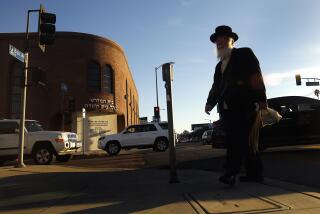Shofars, Playing Cards
- Share via
After sundown on Sept. 10, Rosh Hashana, the Jewish year of 5760 begins. In synagogues throughout the world, the plaintive call of the shofar (ram’s horn) summons Jews to repentance during the holiday. During Rosh Hashana, God decides the fate of each soul for the coming year, and celebrants say, “May you be inscribed in the Book of Life.” However, in Barcelona, Spain, instead of going to temple, a small group of Jews seemingly ignore the occasion, absorbed in their annual card game.
What does it mean?
At a recent conference of Crypto-Judaic Studies, one scholar revealed that descendants of some Inquisition converts (called conversos or anusim) covertly practiced their Jewish faith at Rosh Hashana by placing playing cards on the table while holding prayer books on their laps. Fearing discovery, they surreptitiously chanted New Year’s prayers, and instead of calling their cards cartas, they chose the word barajas (also cards), suggesting a double meaning. In Hebrew, brokcha means prayer.
Consciously and unconsciously, some descendants of Portuguese and Spanish conversos have maintained Jewish rituals while living in a Christian world. “Signs Of Solomon,” a documentary film by Jeremy Siefer, reveals that in contemporary northeastern Brazil, converso descendants hide psalms beneath statues of saints. In northern New Mexico, grave markers in Catholic cemeteries sometimes display Jewish symbols such as stars of David, a menorah, Hebrew letters inside six-petaled flowers, and the first five commandments.
More to Read
Sign up for Essential California
The most important California stories and recommendations in your inbox every morning.
You may occasionally receive promotional content from the Los Angeles Times.













